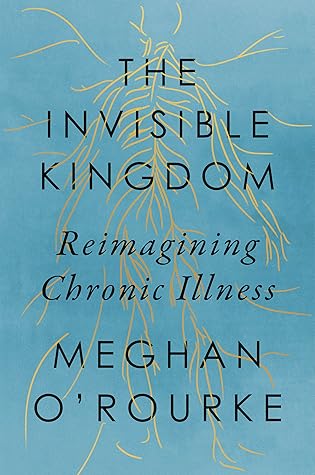More on this book
Community
Kindle Notes & Highlights
Read between
November 10 - December 20, 2022
How was I supposed to be positive about the amorphous and never-ending exhaustion, the sense that my mitochondria were off-kilter? I loved my friends; I wanted my life back. Wasn’t that positive enough?
a professor of psychology at the University of Pennsylvania, studied nearly eleven hundred people with cancer and found no correlation among optimism, positive thinking, and cancer survival rates.
she tries to get people to notice which underlying realities, from environment to mood, make their illness worse and to manage those triggers.
the idea that thoughts could influence body and body could influence thought hardly seems surprising. The problem is that so many patients’ ailments have been reduced to one or the other as a way of shutting down inquiry.
I had caught my friend’s cold. It landed me in bed for two weeks, draining me like a phone running too many apps.
it’s one thing to have these symptoms for a day, or even a week. Suffered daily, they take on a meaning beyond the pain, like being shadowed by a specter. You have a feeling something in your body is trying to defeat you, that something inside you wants you dead.
I at last had a possible name for my remaining problems. Yet instead of feeling relief, I felt I had woken into a nightmare.
I, too, wanted to escape the pain, but the only way would be to die,
“Fatigue” and “pain” hardly cut it; they are anti-dramatic, general, abstract. I don’t have other words to use.
Without quite noticing it, I had slid downward to a place where, as Styron put it, “all sense of hope had vanished, along with the idea of a futurity.”
Can’t you see that I am desperate? I feel like my life is over, and no one is helping me.”
I was furious because I felt I had no ally in this horrible experience. And yet wasn’t sympathy what you were supposed to get when you were sick?
the reality is that many of us are people who, faced with no good choice, shrug our way into the hands of those we don’t trust in search of help.
I began to feel terrified of staying alive like this. What if I could get my health back but only at the cost of having no sense of pleasure or interest in anything?
In no way do I think, or want to suggest, that depression was the root cause of my symptoms or my illness. Rather, in retrospect it is painfully clear that the invisibility of my illness was one of the most challenging parts of my suffering, wearing my resilience down over time.
Only a few friends realized at the time how much physical suffering I was undergoing. We are bad at recognizing the suffering of others unless we are given clear-cut clues and evidence.
The illness was severe but invisible. And that invisibility made all the difference—it made me invisible, which itself almost killed me.
I only wanted the pain and fog to lift. I was, in some profound sense, interrupted and out of time, and it was this—the gray-wool hours through which I moved, the loss of a life as a mother, the loss of meaningful work—that pained me more than anything.
I really want to get better, I thought. No, not “better.” I want to have the will to keep living with this illness.
I had come to understand that there would not be one explanation, one label, one diagnosis for what was happening to me—I knew enough to know that living in uncertainty was my lot.
What I had experienced was life itself, the body straining to survive despite the odds stacked against it.
To be ill is to recognize this interconnectedness—to understand how much we are “a part of the main.” But to be ill in America today is to be brought up against the pathology of a culture that denies this fact.
Onlookers often respond to the experience of chronically ill people by focusing on the supposed positives, presumably because it makes the pain of witness bearable.
It is true that illness is an experience that tests you and forces you to rebuild your life. The destruction it wreaks makes room for re-creation.
There is a razor-thin line between trying to find something usefully redemptive in illness and lying to ourselves about the nature of suffering. Until we mourn what is lost in illness—and until we have a medical community that takes seriously the suffering of patients—we should not celebrate what is gained in it.
I survived, but it was the nature of the disease to rob me of myself.
To be chronically ill is to be in a state of ever-present “camouflaged grieving,” as the historian Jennifer Stitt puts it. It was this ever-present grief I felt was being swept under the rug when my friend counseled me to see the good that had come of my illness. She wasn’t wrong that something had come of it—but her quick counsel negated the complexity of the quest.
not only did I suffer from a disease, but I suffered at the hands of a medical establishment that, for too long, failed to fully credit my testimony.
This is what it is like. Please listen, so that one day you might be able to help.
To become chronically ill is not only to have a disease that you have to manage, but to have a new story about yourself, a story that many people refuse to hear—because it is deeply unsatisfying, full of fits and starts, anger, resentment, chasms of unruly need.


